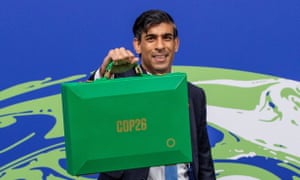The Science Weekly podcast is in Glasgow, where we are bringing listeners daily episodes from Cop26. Each morning you will hear from one of the Guardian’s award-winning environment team. Today, host Madeleine Finlay talks to the Guardian’s biodiversity and environment reporter, Patrick Greenfield, and shadow Cop26 president Ed Miliband about the announcements from finance day
On Wednesday, hundreds of the world’s biggest banks and pension funds, with assets worth $130tn, committed to a key climate goal. The finance pledge, known as the Glasgow Financial Alliance for Net Zero (GFANZ), will mean that by 2050 all assets managed by the institutions will be aligned with net zero emissions. But experts cast doubt on the significance of the move, pointing out that the banks are still free to pour cash into fossil fuels in the next decade. Rishi Sunak announced that London would become the world’s “first net-zero finance centre”, but environmentalists reacted with scepticism.
Today, Science Weekly host Madeleine Finlay talks to the Guardian’s biodiversity and environment reporter, Patrick Greenfield, about these announcements from finance day, plus they catch up with Ed Miliband, who discusses whether the proposals amount to much – or are just more greenwashing from the financial industry.

The Guardian is editorially independent.
And we want to keep our journalism open and accessible to all.
But we increasingly need our readers to fund our work.

